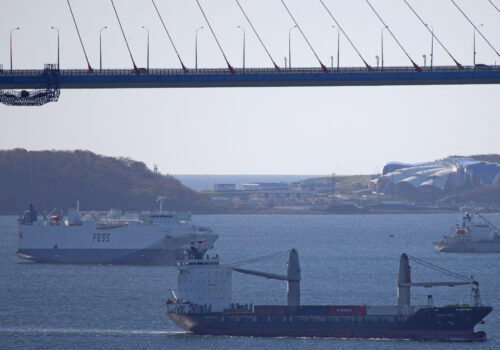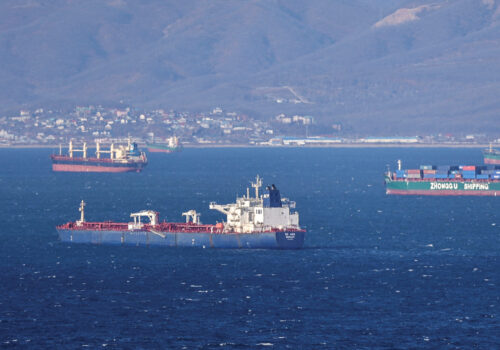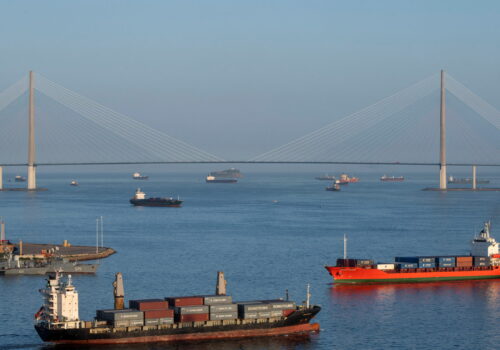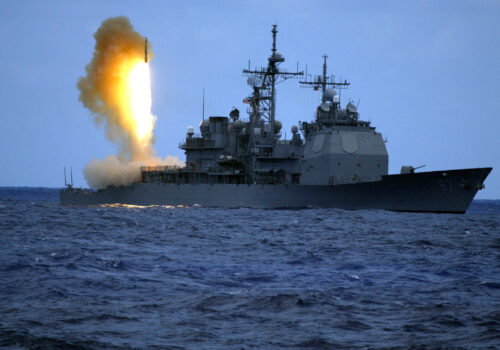The world needs a maritime ‘elite league’ to combat rogue shipping
Key Takeaways
- In April 2025, the International Maritime Organization approved an agreement reducing the shipping sector’s greenhouse gas emissions, making shipping the “first industry to legislate to decarbonize.”
- That this happened without—and potentially despite—the United States signals that the mostly apolitical system that has regulated shipping since the 1950s is subject to the same geopolitical tensions weakening the postwar order.
- With several large states undermining the organization, countries interested in curtailing the rise of shadow vessels and the associated risks of accidents and environmental damage should band together to keep their waters places where the highest standards apply.
A small group of nations established the International Maritime Organization in 1948 to create a modicum of global governance. Since then, IMO (as insiders call it) or the IMO (as most others call it) has fulfilled its task of functioning as a global parliament and secretariat for matters relating to ocean safety. Yet, like all other multilateral organizations, IMO depends on its member states’ goodwill and compliance. Today several large member states undermine the organization, and the United States left its negotiations over greenhouse gas reduction. IMO will continue to function as a steward of global ocean safety. But to achieve better maritime order, states should also join forces in coalitions of the willing or a maritime “elite league.” Countries in such formations could, for example, introduce stricter pollution or protection and indemnity (P&I) insurance rules.
Like many other organizations within the United Nations (UN), and the UN itself, IMO was established in the years immediately following World War II. Even with a Cold War rapidly forming, the world’s nations knew that they would need to share the oceans and that improving maritime safety was in everyone’s interest. Convening in Geneva in 1948, sixteen pioneering nations—ranging from Canada to Pakistan and including one country, Poland, from the emerging Soviet-led East bloc—formed the Inter-Governmental Maritime Consultative Organization (IMCO). 1“Member States,” International Maritime Organization, last visited April 25, 2025, https://www.imo.org/en/OurWork/ERO/Pages/MemberStates.aspx
The Convention on the Inter-Governmental Maritime Consultative Organization stipulated that the new organization would provide “machinery for co-operation among Governments in the field of governmental regulation and practices relating to technical matters of all kinds affecting shipping engaged in international trade, and to encourage the general adoption of the highest practicable standards in matters concerning maritime safety and efficiency of navigation. It would also “encourage the removal of discriminatory action and unnecessary restrictions by Governments affecting shipping engaged in international trade so as to promote the availability of shipping services to the commerce of the world without discrimination.”2“Convention on the International Maritime Organization,” International Maritime Organization, last visited April 25, 2025, https://www.imo.org/en/About/Conventions/Pages/Convention-on-the-International-Maritime-Organization.aspx
The IMCO’s mission was to facilitate safe and fair global shipping. It did so based on consultations and consensus-focused decisions by its members. The convention stipulated that “the functions of the Organization shall be consultative and advisory” and that the organization should “provide for the drafting of conventions, agreements, or other suitable instruments, and to recommend these to Governments and to intergovernmental organizations, and to convene such conferences as may be necessary.”3“Convention on the International Maritime Organization,” International Maritime Organization, last visited April 25, 2025, https://www.imo.org/en/About/Conventions/Pages/Convention-on-the-International-Maritime-Organization.aspx That gave the IMCO’s secretariat no decision-making powers—decisions were to be made by the member states—and certainly no enforcement power.
In successfully founding the IMCO, the sixteen nations had proven that a shared maritime organization was possible even among nations that shared virtually nothing else. They were soon joined by a steady stream of other countries, with early joiners including nations as different as Austria and Myanmar.4“50 Years of Review of Maritime Transport, 1968–2018: Reflecting on the Past, Exploring the Future,” United Nations Conference on Trade and Development, 2018, https://unctad.org/system/files/official-document/dtl2018d1_en.pdf
Mission: Facilitate safe and fair global shipping
The organization proved valuable. As Cold War power dynamics became more entrenched, global shipping continued to function, with ships able to call at any chosen port regardless of the port state’s geopolitical leanings, the ship’s flag state, or the ship’s country of ownership. Along the way, IMO’s members adopted a string of conventions that enhanced shipping safety, including the Convention on the Prevention of Marine Pollution by Dumping of Wastes and Other Matter in 1972, Safety of Life at Sea (SOLAS) in 1974, and the International Convention on the Establishment of an International Fund for Compensation for Oil Pollution Damage in 1971 with an amended version in 1992.5“International Convention on the Establishment of an International Fund for Compensation for Oil Pollution Damage,” International Maritime Organization, last visited May 12, 2025, https://www.imo.org/en/About/Conventions/Pages/International-Convention-on-the-Establishment-of-an-International-Fund-for-Compensation-for-Oil-Pollution-Damage-(FUND).aspx The latter forms the basis of the International Oil Pollution Compensation Funds, a London-based multilateral organization that administers two compensation to victims of oil spills. Another marquee agreement—the International Convention on Oil Pollution Preparedness, Response and Co-operation—was adopted in 1990.6“List of IMO Conventions,” International Maritime Organization, last visited May 12, 2025, https://www.imo.org/en/About/Conventions/Pages/ListOfConventions.aspx
In 1982, having decided that the name IMCO was bulky and confusing, member states renamed the organization the International Maritime Organization. It has continued to oversee the safety of global shipping, and the cargo traveling by sea has continued to grow. In 1980, ships transported 3.7 billion tons of cargo on international voyages; by 2023, the volume had grown to 12.3 billion tons.7“50 Years of Review of Maritime Transport, 1968–2018”; “Review of Maritime Transport 2024,” United Nations Conference on Trade and Development, 2024, https://unctad.org/publication/review-maritime-transport-2024
Today IMO is the world’s default maritime organization, though crucially it is not the custodian of the United Nations Convention on the Law of the Sea (UNCLOS), known as the constitution of the oceans. One hundred and seventy-six of the world’s nations now belong to IMO; the only ones that do not are landlocked countries that have very low gross domestic product (GDP) per capita (such as Burkina Faso, $887), a tiny population (such as Liechtenstein, 39,850 residents), or both.8“Member States,” International Maritime Organization, last visited April 25, 2025, https://www.imo.org/en/OurWork/ERO/Pages/MemberStates.aspx; “GDP Per Capita (Current US$)—Burkina Faso,” World Bank Group, last visited May 12, 2025, https://data.worldbank.org/indicator/NY.GDP.PCAP.CD?locations=BF; “Population, Total—Liechtenstein,” World Bank Group, last visited May 12, 2025, https://data.worldbank.org/indicator/SP.POP.TOTL?locations=LI Taiwan, which has a large maritime industry but is barred from joining the United Nations system as China considers it a renegade province, is also not a member. The IMO Assembly, which approves IMO’s activities and budget and elects IMO’s executive organ, includes all the organization’s member states and meets every two years
Guy Platten, secretary general of the International Chamber of Shipping, said, “What IMO has achieved has been remarkable, things like the MARPOL Convention [the International Convention for the Prevention of Pollution from Ships] and so many other conventions and instruments. The decision-making process does take time, and it’s quite tortuous at times, but the whole idea is that the organization tries to work on a consensus. That means compromises, but it’s pretty effective.”9Interview with the author, April 14, 2025. It has indeed been effective. Even though the 176 member states have widely divergent views and priorities, IMO has managed to become a global protector of safe shipping, albeit a slow-moving one that lacks enforcement powers. Instead, like other UN agencies, it relies on its member states to follow the rules to which they have committed themselves.
Geopolitics, greenhouse gases, and an abrupt US exit
In April 2025, the IMO Marine Environment Protection Committee convened in London to negotiate an agreement reducing the shipping sector’s greenhouse gas (GHG) emissions. The emissions account for about 3 percent of GHG emissions, and IMO member states had been debating and discussing stricter emission rules for several years. Intense negotiations at the April meeting eventually resulted in an agreement that “will progressively lower the annual greenhouse gas fuel intensity of marine fuels, and a greenhouse gas pricing mechanism requiring high-emitting ships to pay for their excess pollution.”10 Vibhu Mishra, “Countries Reach Historic Deal to Cut Shipping Emissions,” UN News, April 11, 2025, https://news.un.org/en/story/2025/04/1162176 The agreement is to be “mandatory for large ocean-going ships over 5,000 gross tonnage, which emit 85% of the total [carbon dioxide] emissions from international shipping.”
The agreement was adopted by a majority of member states (sixty-three, including the twenty-seven European Union (EU) members, the United Kingdom, Brazil, India, China, Norway and Singapore) voting in favor. Sixteen countries (including Saudi Arabia, the United Arab Emirates, and Russia) voted against it, and twenty-five countries (including Argentina and Pacific Island states) abstained.11 John Snyder, “The ‘Great’ Compromise: IMO Agrees to Global Carbon Price for Shipping,” Riviera Maritime Media, April 14, 2025, https://www.rivieramm.com/news-content-hub/the-great-compromise-imo-agrees-to-global-carbon-price-for-shipping-84527; “IMO Approves Net-Zero Regulations for Global Shipping,” International Maritime Organization, April 11, 2025, https://www.imo.org/en/MediaCentre/PressBriefings/pages/IMO-approves-netzero-regulations.aspx The agreement must be formally adopted by a two-thirds majority in October 2025; if that happens, it will enter into force in 2027.12Mishra, “Countries Reach Historic Deal to Cut Shipping Emissions.” However, an unusual event occurred during the negotiations. On instructions from Washington, the US delegation abruptly departed; the US government also sent a note to the other member states, urging them to reconsider their “support for the GHG emissions measures under consideration.” According to two people close to the process who spoke to the author, the US government privately put further pressure on countries to reject the agreement or abstain. Referring to the greenhouse gas emission proposal, the US démarche added, “Should such a blatantly unfair measure go forward, our government will consider reciprocal measures so as to offset any fees charged to U.S. ships and compensate the American people for any other economic harm from any adopted GHG emissions measures.”13 Jonathan Saul, Michelle Nichols, and Kate Abnett, “US Exits Carbon Talks on Shipping, Urges Others to Follow, Document Says,” Reuters, April 9, 2025, https://www.reuters.com/sustainability/boards-policy-regulation/us-exits-carbon-talks-shipping-urges-others-follow-document-2025-04-09
Brian Adrian Wessel, the director general of the Danish Maritime Authority and leader of the Danish negotiating team, said, “Geopolitics entered IMO with these negotiations. There was a coalition of oil-exporting states led by Saudi Arabia and a group of sanctioned states comprising Russia, Iran, Venezuela, and North Korea that opposed the agreement, and then the US de facto joined them in trying to block it. So it was left to the rest of the member states, including the EU and China, to work together to find a solution.”14Interview with the author, April 22, 2025.
He added, “IMO stood its ground with a significant majority vote. In this day and age, a multilateral agreement on green transition is not a given in any way. The first maritime regulation on greenhouse gas emission, passed with a vast majority, that’s historic.”15Interview with the author, April 22, 2025.
Platten said, “This is the first time in around fifteen years that an IMO agreement went to vote. It was quite a moment to be in the plenary hall when that happened. But nonetheless, we have an agreement now, which makes shipping the first industry to legislate to decarbonize, putting a carbon price for the first time, and some reward elements to it as well. What other industries have done anything like that? The answer is none whatsoever.”16 Interview with the author, April 14, 2025. He continued, “IMO is one of the last UN bodies which is still functioning as a multinational body. I think that’s because shipping needs to be globally regulated. It cannot do anything else.”17 Interview with the author, April 14, 2025.
IMO is one of the last UN bodies which is still functioning as a multinational body. I think that’s because shipping needs to be globally regulated.
The deterioration of the global maritime order
The US departure from the negotiations, however, reflected a wider reality. The global maritime order, which nations and the maritime industry have painstakingly constructed over the last century, faces serious travails. To be sure, commitment to maritime treaties has never been complete. Some shipowners and flag states have been indifferent or reckless when it comes to pollution by their ships and, especially in recent years, countries have regularly violated UNCLOS. That was the case with the 1980s Tanker War between Iran and Iraq; the shadow maritime war targeting Iranian and Israeli merchant vessels in the Strait of Hormuz; the Houthis’ attacks on merchant shipping in the Red Sea; and China’s maritime harassment of civilian vessels in the South China Sea.
But nations and companies have largely adhered to IMO’s overwhelmingly technical conventions. One reason for this compliance is that better safety practices benefit everyone. Another is that any ship calling at a port is subject to port state control, the maritime equivalent of a safety inspection, which means that independent inspectors register any rule violations. Owners and flag states must address these deficiencies before ships can continue their journeys.
As the rules-based international order continues to deteriorate, commitment to IMO rules is also slipping. Even though the MARPOL Convention bars ocean pollution (whether involving oil or other substances) by merchant vessels, the world’s growing shadow fleet willingly and systematically accepts a disproportionate risk of oil spills.18Elisabeth Braw, “From Russia’s Shadow Fleet to China’s Maritime Claims: The Freedom of the Seas Is under Threat,” Atlantic Council, January 23, 2025, https://www.atlanticcouncil.org/in-depth-research-reports/report/from-russias-shadow-fleet-to-chinas-maritime-claims-the-freedom-of-the-seas-is-under-threat/ In May 2023, the shadow tanker Pablo exploded off the coast of Malaysia, causing oil spills in local waters, and other shadow vessels have spilled oil elsewhere.19“Oil Suspected from Pablo Wreck Washes Ashore in Indonesia,” Maritime Executive, May 5, 2025, https://maritime-executive.com/article/oil-suspected-from-pablo-wreck-washes-ashore-in-indonesia; Braw, “From Russia’s Shadow Fleet to China’s Maritime Claims.” Despite such dangerous incidents, IMO has been unable to ensure compliance with its rules—even though its member states include several “flags of extreme convenience” (my term) that primarily flag shadow vessels. Insisting on compliance is made yet more difficult by the fact that shadow vessels don’t call at ports of Western countries, where post state controls are typically fully implemented, but instead sail straight to their destination or perform ship-to-ship transfers before returning to their ports of origin. “It’s very tempting to start saying, if they don’t play by the rules, why should we then play by the rules?” Wessel noted.20Interview with the author, April 22, 2025.
Response options for nations committed to maritime governance
IMO member states could introduce proposals aimed at curtailing dangerous shadow vessel practices or, for that matter, proxy group attacks on merchant shipping. Indeed, some IMO member states are teaming up to at least bring attention to systematic violations. “We try to work closely together where we see such issues, whether it’s in Asia or in our own neighborhood, and then take it into the IMO,” Wessel said.21Interview with the author, April 22, 2025.22 Yet most attempts at strengthening rules or creating new ones are likely to be unsuccessful, as nations benefiting from the practices would vote against the measures and encourage other countries to do the same.
“What IMO can do is act as a facilitator,” Platten said. “Everyone wants safe shipping, and that’s what IMO regulates. People make grand statements at IMO, whether it’s on the Ukraine issue or anything else, but ultimately it’s a technical body that decides on regulation for shipping. It’s never at its best when there’s political grandstanding. It’s much better when it gets on with things as it did with the greenhouse gas agreement, which is people working late, late, late into the night to try and find some landing ground.”23 Interview with the author, April 14, 2025.
Within IMO, a significant number of countries around the world are indisputably committed to maintaining and enhancing maritime governance. By definition, shipping encompasses the whole world, and IMO remains irreplaceable as the forum through which the world’s nations can maintain standards. However, it can no longer be assumed that all members want to enhance the global maritime order.
The fact that IMO depends on its global membership for any action, and that leading nations now openly undermine the maritime order, means there is a gap in global maritime governance. It’s clearly in no country’s interest to impose more governance on itself while other countries use the world’s oceans impeded by fewer rules, but countries could team up in self-selecting groups to enhance maritime rules in their waters.
For example, while UNCLOS’s right to innocent passage is sacrosanct, countries affected by the shadow fleet could collectively adopt pollution rules that go beyond MARPOL. The countries that could initiate such an undertaking include coastal states in the Baltic Sea and the North Sea, as well as Malaysia, Indonesia, Singapore, and other countries whose territorial waters and exclusive economic zones shadow vessels regularly traverse.
As the shadow fleet has also led to systematic subversion of maritime incident insurance (known as the P&I club system), coastal states in different parts of the world now share the seemingly intractable problem that suspected shadow vessels sail through their waters with insurance barely worth the paper on which it is written. They, too, can team up to adopt stricter insurance rules. Adopting stricter pollution rules, P&I insurance rules, or both would enhance maritime safety without detracting from IMO. In that way, they would resemble initiatives by NATO member states that have a regional focus and take place outside NATO but don’t undermine the Alliance. They include, most prominently, the Joint Expeditionary Forces, which encompass ten northern European countries.24“The Joint Expeditionary Force,” Joint Expeditionary Force, last visited May 12, 2025, https://jefnations.org/.
Sailing in safer waters
The International Maritime Organization serves the world’s nations and the shipping industry well, but it is undermined by growing geopolitical tensions and decreasing commitment to global rules and institutions. While IMO can continue serving a crucial function as the world’s default maritime convener, nations committed to the maritime order can enhance safety in their waters by forming coalitions of the willing that share, for example, stricter rules on pollution or P&I insurance. That would make sailing in their waters more expensive. It would also, however, help nations committed to the maritime order establish a maritime “elite league” in whose waters all maritime participants would know that the highest standards apply.
About the author
Featured project
Related content
Explore the program

The Transatlantic Security Initiative aims to reinforce the strong and resilient transatlantic relationship that is prepared to deter and defend, succeed in strategic competition, and harness emerging capabilities to address future threats and opportunities.
Image: Designed by Freepik




